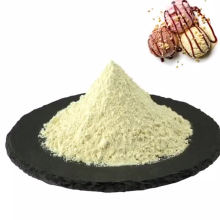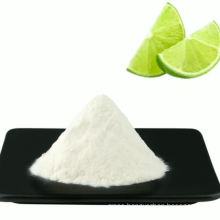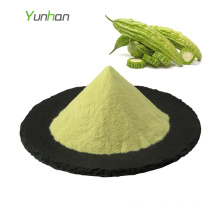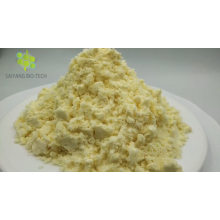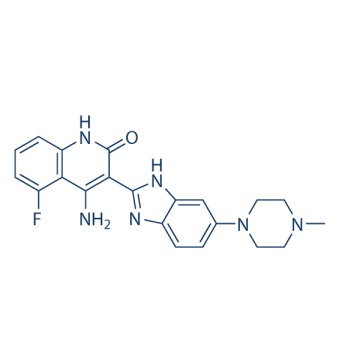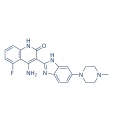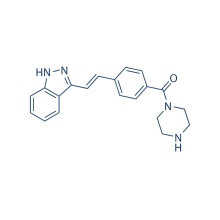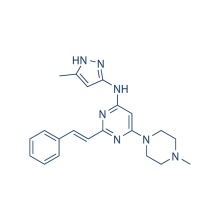Masitinib (AB1010) 790299-79-5
Product Description
.cp_wz table {border-top: 1px solid #ccc;border-left:1px solid #ccc; } .cp_wz table td{border-right: 1px solid #ccc; border-bottom: 1px solid #ccc; padding: 5px 0px 0px 5px;} .cp_wz table th {border-right: 1px solid #ccc;border-bottom: 1px solid #ccc; padding: 5px 0px 0px 5px;}
Molecular Weight:
498.64 Masitinib is a novel inhibitor for Kit and PDGFRα/β with IC50 of 200 nM and 540 nM/800 nM, weak inhibition to ABL and c-Fms. Phase 3.
Biological Activity
Masitinib is a competitive inhibitor against ATP at concentrations ≤500
nM. Masitinib also potently inhibits recombinant PDGFR and the
intracellular kinase Lyn, and to a lesser extent, fibroblast growth
factor receptor 3. In contrast, Masitinib demonstrates weak inhibition
of Abl and c-Fms. Masitinib more strongly inhibits degranulation,
cytokine production, and bone marrow mast cell migration than imatinib.
In Ba/F3 cells expressing human wild-type Kit, Masitinib inhibits SCF
(stem cell factor)-induced cell proliferation with an IC50 of 150 nM,
while the IC50 for inhibition of IL-3-stimulated proliferation is at
approximately >10 µM. In Ba/F3 cells expressing PDGFRα, Masitinib
inhibits PDGF-BB-stimulated proliferation and PDGFRα tyrosine
phosphorylation with IC50 of 300 nM. Masitinib also causes inhibition of
SCF-stimulated tyrosine phosphorylation of human Kit in mastocytoma
cell-lines and BMMC.
Masitinib inhibits Kit gain-of-function mutants,
including V559D mutant and Δ27 mouse mutant with IC50 of 3 and 5 nM in
Ba/F3 cells. Masitinib inhibits the cell proliferation of mastocytoma
cell lines including HMC-1α155 and FMA3 with IC50 of 10 and 30 nM,
respectively. Masitinib inhibits cell growth and PDGFR
phosphorylation in two novel ISS cell lines, which suggest that
Masitinib displays activity against both primary and metastatic ISS cell
line and may aid in the clinical management of ISS.
Masitinib inhibits tumour growth and increases the median survival time
in Δ27-expressing Ba/F3 tumor models at 30 mg/kg, without cardiotoxicity
or genotoxicity. Masitinib (12.5 mg/kg/d PO) increases overall TTP (time-to-tumor progression) compared with placebo in dogs. The combination of masitinib/gemcitabine shows synergy in vitro on
proliferation of gemcitabine-refractory cell lines Mia Paca2 and Panc1,
and to a lesser extent on Mia Paca-2 pancreatic tumours in Nog CID mice.
In vitro enzyme-linked immunoassay with recombinant protein kinases
A 96-well microtitre plateis coated overnight with 0.25 mg/ml
poly(Glu,Tyr 4:1), rinsed twice with 250 µL of washing buffer (10 mM
phosphate-buffered saline [pH 7.4] and 0.05% Tween 20) and dried for 2
hours at room temperature. Assays are performed at room temperature with
a final volume of 50 µL in kinase buffer (10 mM MgCl2, 1 mM MnCl2,
1 mM sodium orthovanadate, 20 mM HEPES, pH 7.8) containing ATP at a
concentration of at least twice the Km for each enzyme and an
appropriate amount of recombinant enzyme to ensure a linear reaction
rate.
Reactions are initiated upon introduction of the enzyme and
terminated with the addition of one reaction volume (50 μL) of 100 mM
EDTA per 5 M urea mix. Plates are washed three times and incubated with
1:30,000 horseradish peroxidase-conjugated anti-phosphotyrosine
monoclonal antibody, then washed three times and incubated with
tetramethylbenzidine. The final reaction product is quantified by
spectrophotometry at 450 nm.
Method
For the assay of Ba/F3 cell proliferation, microtitre plates are seeded with a total of 104 cells/well in 100 μL of RPMI 1640 medium with 10% foetal bovine serum
at 37 °C. These are supplemented, or not, with either 0.1% conditioned
medium from X63-IL-3 cells or 250 ng/mL murine SCF. The murine SCF,
which activates Kit, is purified from the conditioned medium of
SCF-producing CHO cells.
Cells are grown for 48 hours at 37 °C with
Masitinib and then incubated with 10 μL/well of WST-1 reagent for 3
hours at 37 °C. The amount of formazan dye formed is quantified by its
absorbance at 450 nm using a scanning multiwell spectrophotometer. A
blank well without cells is used as a background control for the
spectrophotometer.
Contact us if you need more details on 790299-79-5. We are ready to answer your questions on packaging, logistics, certification or any other aspects about Masitinib 790299-79-5、AB1010 790299-79-5. If these products fail to match your need, please contact us and we would like to provide relevant information.
Molecular Weight:
498.64 Masitinib is a novel inhibitor for Kit and PDGFRα/β with IC50 of 200 nM and 540 nM/800 nM, weak inhibition to ABL and c-Fms. Phase 3.
Biological Activity
Masitinib is a competitive inhibitor against ATP at concentrations ≤500
nM. Masitinib also potently inhibits recombinant PDGFR and the
intracellular kinase Lyn, and to a lesser extent, fibroblast growth
factor receptor 3. In contrast, Masitinib demonstrates weak inhibition
of Abl and c-Fms. Masitinib more strongly inhibits degranulation,
cytokine production, and bone marrow mast cell migration than imatinib.
In Ba/F3 cells expressing human wild-type Kit, Masitinib inhibits SCF
(stem cell factor)-induced cell proliferation with an IC50 of 150 nM,
while the IC50 for inhibition of IL-3-stimulated proliferation is at
approximately >10 µM. In Ba/F3 cells expressing PDGFRα, Masitinib
inhibits PDGF-BB-stimulated proliferation and PDGFRα tyrosine
phosphorylation with IC50 of 300 nM. Masitinib also causes inhibition of
SCF-stimulated tyrosine phosphorylation of human Kit in mastocytoma
cell-lines and BMMC.
Masitinib inhibits Kit gain-of-function mutants,
including V559D mutant and Δ27 mouse mutant with IC50 of 3 and 5 nM in
Ba/F3 cells. Masitinib inhibits the cell proliferation of mastocytoma
cell lines including HMC-1α155 and FMA3 with IC50 of 10 and 30 nM,
respectively. Masitinib inhibits cell growth and PDGFR
phosphorylation in two novel ISS cell lines, which suggest that
Masitinib displays activity against both primary and metastatic ISS cell
line and may aid in the clinical management of ISS.
Masitinib inhibits tumour growth and increases the median survival time
in Δ27-expressing Ba/F3 tumor models at 30 mg/kg, without cardiotoxicity
or genotoxicity. Masitinib (12.5 mg/kg/d PO) increases overall TTP (time-to-tumor progression) compared with placebo in dogs. The combination of masitinib/gemcitabine shows synergy in vitro on
proliferation of gemcitabine-refractory cell lines Mia Paca2 and Panc1,
and to a lesser extent on Mia Paca-2 pancreatic tumours in Nog CID mice.
In vitro enzyme-linked immunoassay with recombinant protein kinases
A 96-well microtitre plateis coated overnight with 0.25 mg/ml
poly(Glu,Tyr 4:1), rinsed twice with 250 µL of washing buffer (10 mM
phosphate-buffered saline [pH 7.4] and 0.05% Tween 20) and dried for 2
hours at room temperature. Assays are performed at room temperature with
a final volume of 50 µL in kinase buffer (10 mM MgCl2, 1 mM MnCl2,
1 mM sodium orthovanadate, 20 mM HEPES, pH 7.8) containing ATP at a
concentration of at least twice the Km for each enzyme and an
appropriate amount of recombinant enzyme to ensure a linear reaction
rate.
Reactions are initiated upon introduction of the enzyme and
terminated with the addition of one reaction volume (50 μL) of 100 mM
EDTA per 5 M urea mix. Plates are washed three times and incubated with
1:30,000 horseradish peroxidase-conjugated anti-phosphotyrosine
monoclonal antibody, then washed three times and incubated with
tetramethylbenzidine. The final reaction product is quantified by
spectrophotometry at 450 nm.
Method
For the assay of Ba/F3 cell proliferation, microtitre plates are seeded with a total of 104 cells/well in 100 μL of RPMI 1640 medium with 10% foetal bovine serum
at 37 °C. These are supplemented, or not, with either 0.1% conditioned
medium from X63-IL-3 cells or 250 ng/mL murine SCF. The murine SCF,
which activates Kit, is purified from the conditioned medium of
SCF-producing CHO cells.
Cells are grown for 48 hours at 37 °C with
Masitinib and then incubated with 10 μL/well of WST-1 reagent for 3
hours at 37 °C. The amount of formazan dye formed is quantified by its
absorbance at 450 nm using a scanning multiwell spectrophotometer. A
blank well without cells is used as a background control for the
spectrophotometer.
Contact us if you need more details on 790299-79-5. We are ready to answer your questions on packaging, logistics, certification or any other aspects about Masitinib 790299-79-5、AB1010 790299-79-5. If these products fail to match your need, please contact us and we would like to provide relevant information.
Product Categories : Protein Tyrosine Kinase > FLT3 Inhibitor
Other Products
Hot Products
Astragaloside AChlortetracycline HCl 64-72-2Paclitaxel 33069-62-4Dexamethasone Acetate 1177-87-3Dinaciclib (SCH727965) 779353-01-4CHIR-124 405168-58-3Ro3280 1062243-51-9TAME 901-47-3CCG-1423 285986-88-110058-F4 403811-55-2Dabigatran (BIBR 953) 211914-51-1H 89 2HCl 130964-39-5T0901317 293754-55-9Aprepitant 170729-80-3Turofexorate Isopropyl (XL335) 629664-81-9BMS-378806 357263-13-9
